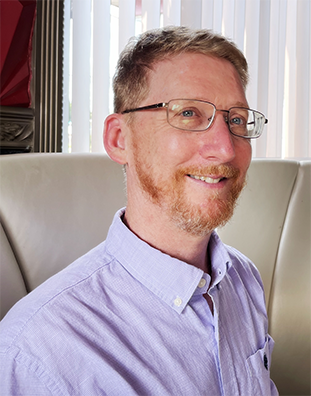Stephen Dixon’s path to his current job was a winding one, paved by inner-strength, self-determination, and support from others—including Virginia’s Department for Aging and Rehabilitative Services (DARS).
The importance of support from others is something Stephen understands from multiple perspectives, since it’s central to his profession. As Health Care Chaplain at Southern Virginia Mental Health Institute in Danville, he supports patients of all faiths through individual spiritual counseling as well as group activities and classes.
A life-changing event in 2017 served as a major turning point on Stephen’s career journey. At the time, he was living in Danville but in the process of moving to Patrick Springs, about an hour away. He was also in a very different line of work back then—running a computer business he established with a friend in the early 2000s.
One day, Stephen was struck by a driver speeding at more than 100 miles per hour. He sustained significant, multiple injuries and spent the next month in the hospital. “It was the start of a long recovery. I was literally broken from head to foot,” he said. “I had a brain injury, pelvis injury, my skull was shattered. Both of my femurs were broken, with the left one being shattered. The only limb not in a cast was my right arm.”
Because the person who hit him didn’t have insurance, Stephen did not get financial help. When he and his wife moved to Patrick Springs, they faced an uncertain future while navigating the complexities of disability benefits and adjusting to a new community. As he continued his recovery, which has included numerous surgeries and intensive physical therapy, he found his new home offered a new viewpoint—literally and figuratively.
Before the accident, Stephen had considered going back to school to become a teacher or getting more formal training in information technology, since he was primarily self-taught. “I love learning, and especially learning history and language. It’s something that had always been cooking in my mind. At heart, I’m a teacher and a preacher.”
The decision to pursue this path finally became clear to him at his new home in Patrick Springs. “I was sitting there, in our backyard. If you’re coming into Patrick County, there are three mountains you see,” Stephen said. “One day I was looking out the window in the wheelchair, thinking ‘what am I supposed to do?’ The name of one of those mountains I was looking at is ‘No Business Mountain.’ That’s when I knew I was through with business. The answer was to go back to school.”
In 2018, one year after the accident, Stephen began graduate studies through Liberty University, starting with just a few classes at first and eventually earning two master’s degrees, one in theology and the other in divinity. While seeking online adjunct teaching positions, he took a position as a pastor. The senior pastor who hired him offered sage career advice based on his own experience as a disabled veteran. “He said, ‘there are agencies that can help.’ He was familiar with how they worked. He told me about DARS, and I went online and that’s how I connected with them.”
DARS then became a partner to Stephen in his journey, helping him clarify his goals and identify opportunities for reaching them. This included introducing him to the Alternative Hiring Process (AHP), which could facilitate employment with state government entities, including community colleges and universities.
Implemented in 2022, the AHP is part of the Commonwealth of Virginia’s initiative to be a model employer of people with disabilities. It’s a key component of DARS’ Pathways to Careers (Pathways) program, which is funded through a grant from the U.S. Department of Education.
A person applying for a state job through the AHP must be certified as an individual with a disability that results in a barrier to employment as determined by DARS. This certification is documented in the form of an AHP letter. Individuals interested in state employment then submit the AHP letter with their application.
Stephen had seen the AHP mentioned in job announcements, so he applied for and received one. As he kept job searching, so did the Vocational Rehabilitation Counselor (VRC) on his behalf, and that’s how he found out about the position at the Southern Virginia Mental Health Institute. He applied, interviewed, and started working part-time soon after.
After nearly a year, Stephen transitioned to working full-time. This means he’s entitled to greater benefits and has more time with the patients. He and his wife recently moved back to Danville, so he no longer has an hour commute each way. He is also working toward his PhD and preaches at a church near his home.
“It's all been a little bit of a whirlwind, but I love what I do. I look forward to getting to work every day. My supervisor is amazing. She cares deeply about the patients, and that makes all the difference,” he said. “But DARS was crucial. I wanted to do this. I wanted to prove to myself that I could do this, but they were really the heroes. It meant everything to me. They were so supportive.”
“Through all of this, I have met several people who are disabled, and some do not trust government agencies,” he added. “I would tell those people to put your doubts aside, because this one door is going to open up many more opportunities. They, DARS, are there to help. They want to see you succeed.”
